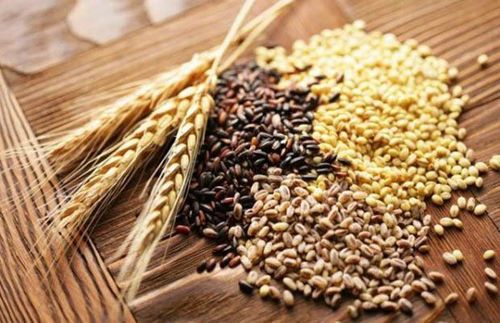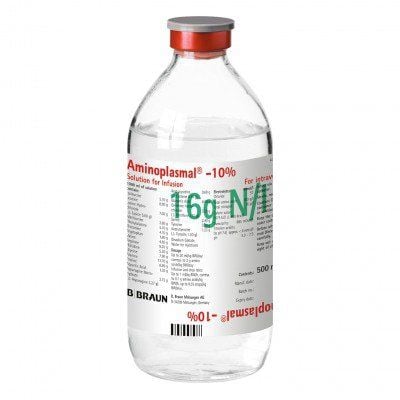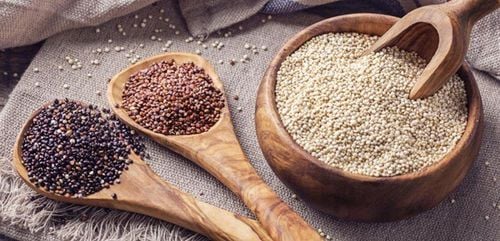This is an automatically translated article.
Quinoa is one of the healthiest foods in the world. Quinoa is not only gluten-free, it's also rich in protein and is one of the few plant foods that contain adequate amounts of all nine essential amino acids. In addition, quinoa is also rich in fiber, magnesium, B vitamins, iron, potassium, calcium, phosphorus, vitamin E and many beneficial antioxidants.1. Quinoa seeds are rich in nutrients and nutritious
Quinoa or quinoa is considered a cereal crop quite rich in nutritional composition. Technically, however, quinoa is not a real grain but a pseudo-grain, prepared and used in a similar way to a grain.
This nut has been used for thousands of years in South America and has only and until recently become a trending food reaching superfood status.
Quinoa comes in three main varieties: White quinoa, red quinoa, and black quinoa. And the composition of nutrients in 185 grams of cooked quinoa:
Protein: 8 grams. Fiber: 5 grams. Manganese: 58% of the RDA- Recommended Daily Amount of Magnesium: 30% of the RDA. Phosphorus: 28% of the RDA. Folate: 19% of the RDA. Bronze: 18% of RDA. Iron: 15% of the RDA. Zinc: 13% of the RDA. Potassium 9% RDA. More than 10% of the RDA for vitamins B1, B2, and B6. Quinoa seeds are gluten-free and are often grown organically.
NASA scientists have considered it as a suitable crop for growing in space, mainly based on its high nutrient content, ease of use, and simplicity in growing and harvesting. The United Nations (UN) has declared 2013 the "International Year of Quinoa" due to quinoa's high nutritional value and potential to contribute to worldwide food security.
2. Quinoa contains the plant compounds Quercetin and Kaempferol
The health effects of foods go beyond the vitamins and minerals you may be familiar with. There will be thousands of micronutrients, some of which are extremely healthy, including phyto-antioxidants, that have been shown to provide a wide range of health benefits. The flavonoid compounds that have been studied particularly well are quercetin and kaempferol, both of which are found in large amounts in quinoa seeds. The content of the compound quercetin in quinoa is even higher than in typical high-quercetin foods like: cranberries. These key molecules have been shown to have anti-inflammatory, anti-viral, anti-cancer, and anti-depressant effects in animal studies.
3. Quinoa is rich in fiber, much higher than most grains
The fiber content in quinoa is quite high. Quinoa has about 10–16 grams of fiber per 100 grams, or 17–27 grams per cup, which is very high – more than double that of most grains. Boiled quinoa contains much less fiber, in grams, because it absorbs a lot of water.
However, most of the fiber in quinoa is insoluble, which doesn't seem to have the same health benefits as soluble fiber. The soluble fiber content of quinoa is quite rich, with about 2.5 grams per cup or 1.5 grams per 100 grams. The effects of soluble fiber can help lower blood sugar, lower cholesterol, increase satiety, and aid in weight loss.
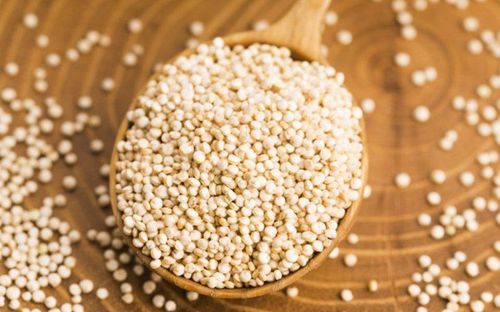
Hạt quinoa có khoảng 10–16 gam chất xơ trong mỗi 100gr
4. Quinoa is gluten-free and perfect for people with gluten intolerance
According to the results of a survey, about a third of people in the US are trying to reduce or avoid gluten. A gluten-free diet can be healthy, as long as it's based on foods that are naturally gluten-free.
Many researchers have looked at quinoa as a suitable ingredient option in a gluten-free diet for people who don't want to give up foods like bread and pasta.
Studies have shown that using quinoa instead of other grains with typical gluten-free ingredients such as: Refined tapioca, potatoes, corn and rice flour can significantly increase nutritional value. and antioxidants in your diet.
5. Quinoa is rich in protein, with all the essential amino acids
Protein consists of amino acids, especially essential amino acids, because your body cannot produce them and must obtain them through your diet.
If a food contains all nine essential amino acids, quinoa is called a complete protein.
Although there are many plant-based foods that are completely deficient in the amino acid lysine, this is the exception with quinoa. For this reason, quinoa seeds are an excellent source of protein.
6. Quinoa has a low glycemic index, good for blood sugar control
The glycemic index is used as a measure of how quickly a food raises the body's blood sugar. Eating foods with a high glycemic index can increase hunger and contribute to obesity. Foods with a high glycemic index are also linked to many common, chronic diseases such as type 2 diabetes and heart disease.
Quinoa has a low glycemic index. However, it's important to note that quinoa is still fairly high in carbs. Therefore, choosing quinoa for weight loss is not a good choice if you are following a low-carb diet.
7. Quinoa seeds promise many important minerals like iron and magnesium
Many people don't get enough of certain important nutrients, like: Minerals, especially magnesium, potassium, zinc and iron (for women). Quinoa is high in minerals, especially magnesium, with one cup (185 grams) providing about 30% of the RDA. However, quinoa seeds contain phytic acid, which can bind these minerals and reduce the absorption of minerals from quinoa seeds into the body. However, by taking measures such as soaking or sprouting quinoa before cooking, you can reduce the phytic acid content of this grain and make these minerals more bioavailable.
Quinoa seeds are also relatively high in oxalates, which can reduce calcium absorption and may cause problems for some people with recurrent kidney stones.
8. Quinoa has beneficial effects on metabolic health
With high levels of beneficial nutrients, quinoa seeds can improve metabolic health. Using quinoa instead of typical gluten-free bread and pasta significantly lowers blood sugar, insulin levels, and triglycerides. However, more research is needed to fully understand the effects of quinoa on metabolic health.
9. Quinoa is full of antioxidants
Quinoa seeds are rich in antioxidants, which neutralize free radicals and are believed to help fight aging and many diseases. One study, looking at antioxidant levels in five grains, three mock grains, and two legumes found that quinoa had the highest antioxidant levels of all the ten foods given. Has a good antioxidant content. Sprouted quinoa seeds seem to increase the antioxidant content even further.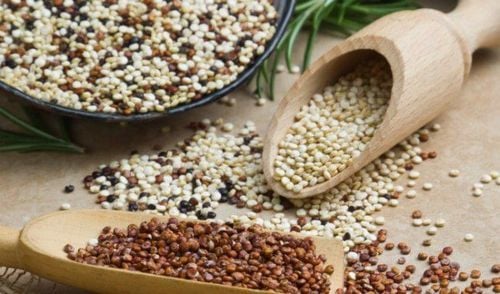
Hạt quinoa rất giàu chất chống oxy hóa
10. Quinoa can help you lose weight effectively
Slimming quinoa helps you take in fewer calories than you burn. Certain food properties in quinoa may promote weight loss, either by boosting metabolism or reducing appetite.
Moreover, quinoa contains a lot of protein, which can both boost metabolism and reduce appetite significantly. The high fiber content in quinoa can increase feelings of fullness, causing you to eat fewer calories. Quinoa has a low glycemic index, which will help make choosing such foods as associated with reduced calorie intake. Although there are still no studies looking at the effects of quinoa on body weight, quinoa is still known as a healthy food for weight loss.
11. Quinoa is easy to incorporate into your diet
While not directly beneficial to health, the fact that quinoa seeds are so easy to incorporate into your diet is nonetheless important. Quinoa is also delicious and goes well with many foods.
Depending on the type of quinoa, for proper preparation, however, it must first be rinsed with water prior to cooking to remove saponins, which are found in the outer layer of the quinoa seed and can impart a bitter taste when cooked. use.
Please dial HOTLINE for more information or register for an appointment HERE. Download MyVinmec app to make appointments faster and to manage your bookings easily.
Reference source: healthline.com




